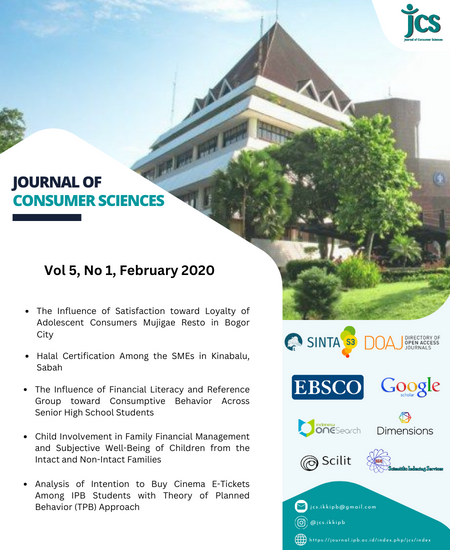Child Involvement in Family Financial Management and Subjective Well-Being of Children from the Intact and Non-Intact Families
Abstract
The purpose of this research is to analyze the influence of child involvement in family financial management and material well-being on children’s subjective well-being among children from intact families and non-intact families. Fifty students from intact families and fifty students from the non-intact family have participated in this research. The students were selected using stratified random sampling techniques from junior high schools in Bogor Regency. Data were collected using a self-administered questionnaire and were followed with in-depth interviews with some students. The result of this research showed that child involvement, material well-being, and subjective well-being were categorized as medium. The result of the independent sample T-test showed that there were no significant differences between students from intact families and students from non-intact families in terms of their involvement in family financial management, material well-being, and subjective well-being. The result of the multiple linear regression test showed that child involvement in family financial management significantly positively affected their subjective well-being. Thus, the higher the children involved in family financial management, the better their subjective well-being.
References
Amato, P. R., & Keith, B. (1991). Parental divorce and the well-being of children: a meta-analysis. Psychological Bulletin, 110(1), 26-46. https://doi.org/10.1037/0033-2909.110.1.26
Ben-Arieh, A. (2008). The child indicators movement: Past, present and future. Child Indicators Research, 1(1), 3-16. https://doi.org/10.1007/s12187-007-9003-1
Hansen, T., Slagsvold, B., & Moum, T. (2008). Financial satisfaction in old age: A satisfaction paradox or a result of accumulated wealth? Social Indicators happiness and UNDP’s Analysis of Poverty, Wealth and Development. Journal of Happiness Studies, 10(1), 93-111. https://doi.org/10.1007/s11205-007-9234-z
Judicial Agency Religion. (2018). Laporan Tahunan Pengadilan Agama Cibinong. Kabupaten Bogor, Indonesia.
Khomsan, A. (2000). Teknik Pengukuran Pengetahuan Gizi. Bogor: Institut Pertanian Bogor
Laftman, S. B. (2009). Family structure and children’s living conditions. a comparative study of 24 countries. Child Indicators Research, 3(1), 127-147. https://doi.org/10.1007/s12187-009-9059-1
Main, G. (2019). Child poverty and subjective well-being: The impact of children's perceptions of fairness and involvement in intra-household sharing. Children and Youth Services Review, 30(4). https://doi.org/10.1016/j.childyouth.2017.06.031.
Main, G., Montserrat, C., Andresen, S., Bradshaw, J. & Lee, B., J. (2017). Inequality, material well-being, and subjective well-being: Exploring associations for children across 15 diverse countries. Children and Youth Services Review, 97, 3-13. http://dx.doi.org/10.1016/j.childyouth.2017.06.033
Ministry of Women Empowerment and Child Protection. (2010). Laporan Akhir Kajian Awal Penyusunan Indikator Komposit Perlindungan Anak. Jakarta: Indonesia.
Monks, F. J., Knoers, A. M. P., & Haditono, S. R. (2001). Psikologi Perkembangan: Pengantar dalam Berbagai Bagiannya. Yogyakarta: UGM Press.
Puspitawati, H. (2012). Gender dan Keluarga: Konsep dan Realita di Indonesia. Bogor: IPB Press.
Rees, G., & Main, G. (2015). Children's view on their lives and well-being in 15 countries: An initial report on the Children's Worlds survey, 2013–2014. York, UK: Children's Worlds Project (ISCWeB).
Rini, Y. S. (2014). Komunikasi orang tua-anak dalam pengambilan keputusan pendidikan. Jurnal Interaksi, 3(2), 112-122. http://dx.doi.org/10.14710/interaksi.3.2.112-122
Schimmel, J. (2009). Development as happiness: the subjective perception of happiness and UNDP’s analysis of poverty, wealth, and development. Journal of Happiness Studies, 10(1). http://dx.doi.org/10.1007/s10902-007-9063-4.
Shek, D. T. L. (2007). Intact and non-intact families in Hong Kong. Journal of Divorce & Remarriage, 47(1-2), 157-172. https://doi.org/10.1300/J087v47n01_09
Sirgy, M. J. (2018). The psychology of material well-being: applied research quality life. International Society for Quality of Life, 13(2), 273-301. http://dx.doi.org/10.1007/s11482-017-9590-z.
Sitepu, A. L. (2014). Keterlibatan anak remaja dalam pengambilan keputusan mengenai kebutuhannya serta kaitannya dengan pengasuhan orang tua. Retrieved from http://lib.ui.ac.id/naskahringkas/2016-08/S55349-Ayusha%20Laksmi%20Sitepu%20Pandebesi
Soemanto, R. B., & Haryono, B. (2018). Kenakalan pelajar dalam keluarga single parent: studi kasus pada pelajar dalam keluarga single parent di Sekolah Menengah Atas Negeri 1 Girimarto, Wonogiri Tahun 2012/2013. Jurnal Analisa Sosiologi, 4(2).
Statistics Indonesia. (2017). Statistik Indonesia 2017. Jakarta: Badan Pusat Statistik.
Steele, F., Sigle-Rushton, W., & Kravdal, Ø. (2009). Consequences of family disruption on children’s educational outcomes in Norway. Demography, 46(3), 553-574. https://doi.org/10.1353/dem.0.0063
Yulianti, N., & Silvy, M. (2013). Sikap pengelolaan keuangan dan perilaku perencanaan investasi keluarga di Surabaya. Journal of Business and Banking, 3(1), 57-68. http://dx.doi.org/10.14414/jbb.v3i1.254
Authors
Authors who publish with this journal agree to the following terms:
- Authors retain copyright and grant the journal right of first publication with the work simultaneously licensed under a

This work is licensed under a Creative Commons Attribution 4.0 International License. that allows others to share the work with an acknowledgement of the work's authorship and initial publication in this journal. - Authors are able to enter into separate, additional contractual arrangements for the non-exclusive distribution of the journal's published version of the work (e.g., post it to an institutional repository or publish it in a book), with an acknowledgement of its initial publication in this journal.
- Authors are permitted and encouraged to post their work online (e.g., in institutional repositories or on their website) prior to and during the submission process, as it can lead to productive exchanges, as well as earlier and greater citation of published work (See The Effect of Open Access).







